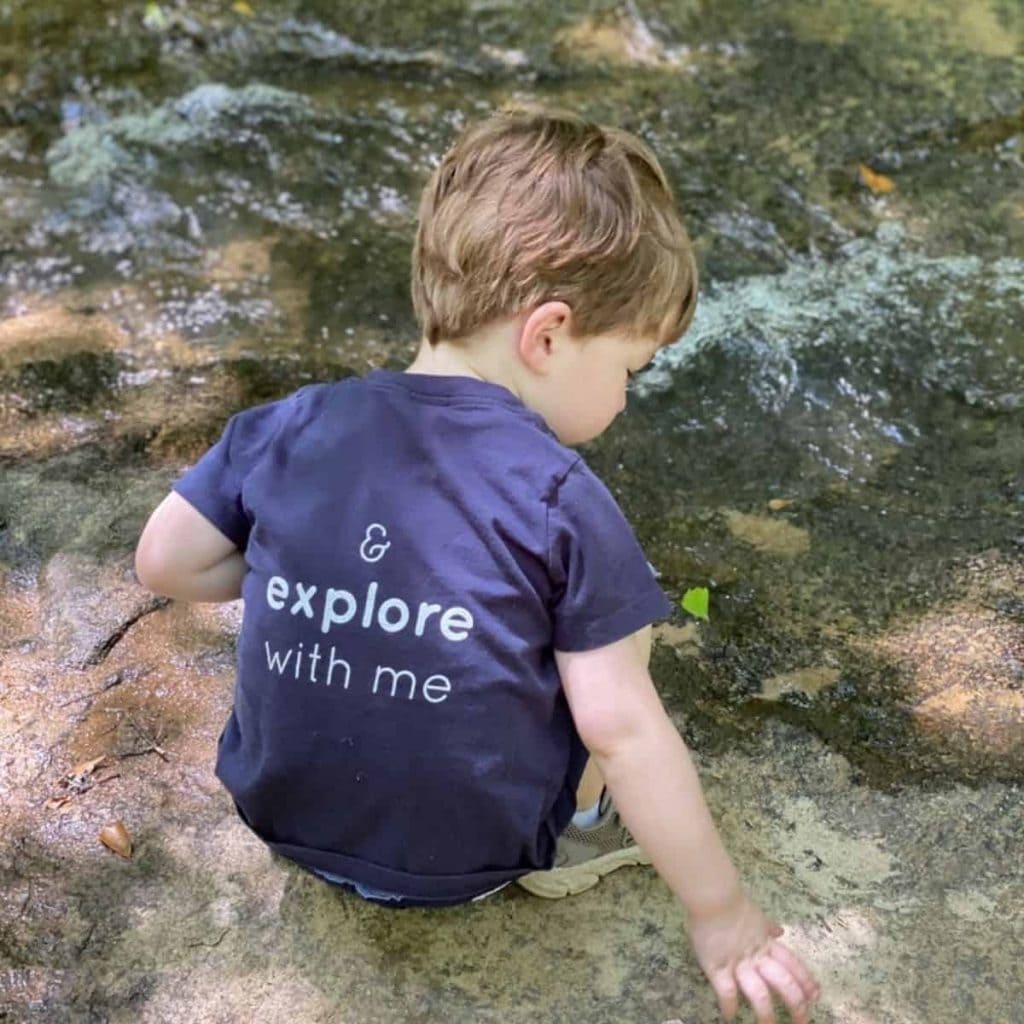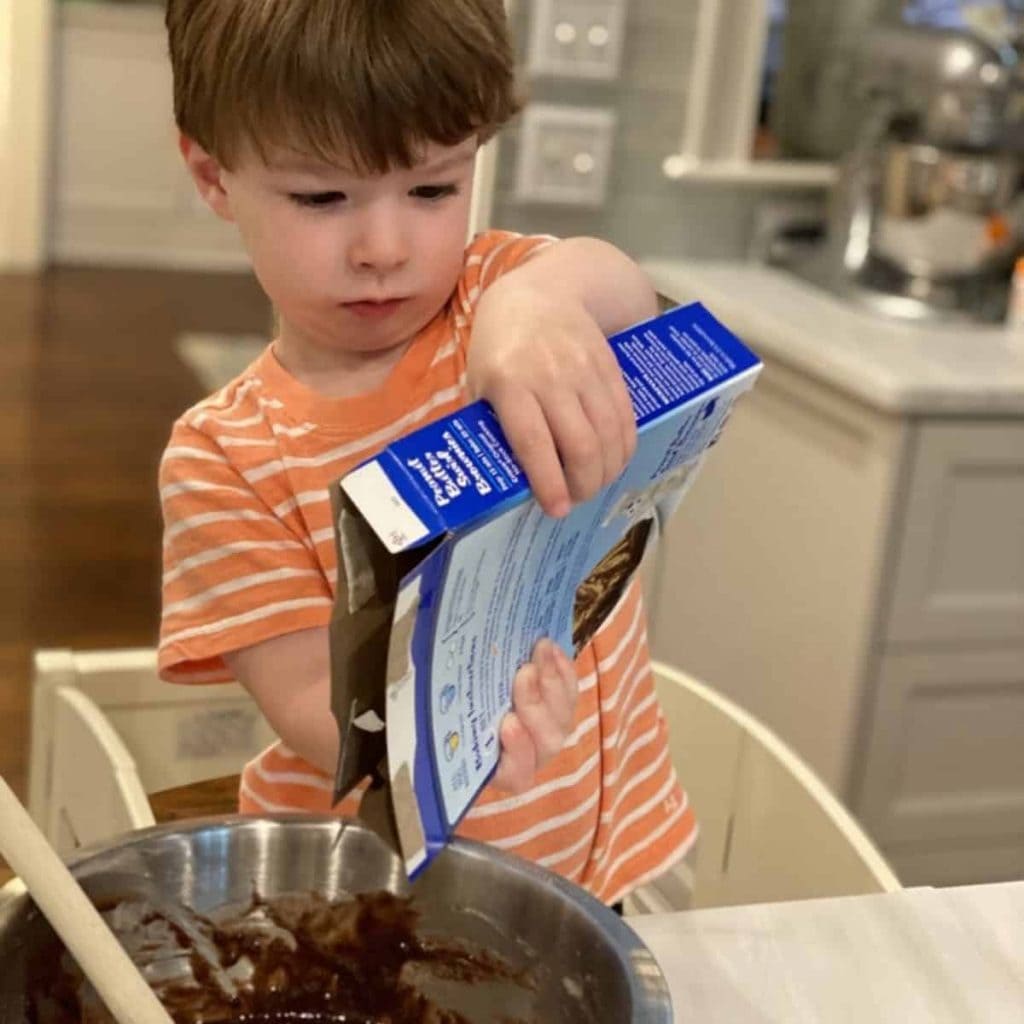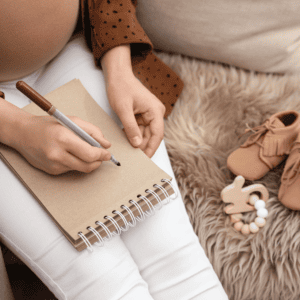My husband and I recently had a conversation about how independent our daughter should be. It’s a never ending question that began basically as soon as she started moving around on her own. From toddler independence to learning to do things for herself as a preschooler and beyond, we know we’ll be grappling with how to teach independence for years to come.
I’ve also been talking about this a lot recently with Katy, Undefining Motherhood’s founder. While we wondered if we could get a few extra minutes of sleep by letting our 5-year-old pour cereal for herself and her sister, Katy was unlocking the pantry.
She’d kept it locked since Jack started crawling, but when he was nearing the age of 3, she realized she was creating far more work for herself by getting snacks for him than by letting him do it himself.
Why do we make our lives harder by doing everything for our children? Why don’t we trust that they’re old enough to practice toddler independence in ways that will help them emotionally and developmentally?
What do we fear would happen if things went awry? My worst-case scenario was milk on the floor, and Katy’s was that Jack would make a mess of snacks.
For some reason, we seem to hold back from encouraging independence in toddlers. Instead, many of us abide by their every whim and act a bit like personal servants.
As children grow, it’s crucial to look at the benefits of toddler independence and figure out the best way to let them exercise small amounts of control where appropriate.
From making their own breakfasts to assisting with household chores, our little ones tend to be much more capable than we are often willing to allow.

This site contains affiliate links, meaning that we earn a small commission for purchases made through our site. We only recommend products we personally use, love, or have thoroughly vetted.
- Why is it Important for a Child to Be Independent?
- Child Independence & Age: When Should I Allow My Child to Become Independent?
- Tips for Helping Your Little Ones Become More Independent
- How to Teach Independence Without Losing Your Temper
- Encouraging Independence in Toddlers is the Best Thing for Everyone
Why is it Important for a Child to Be Independent?
At some point, your child will begin doing two things:
- Expressing an interest in doing tasks on their own
- Pushing back against your rules and directions
While begging your child to hurry as they try to dress themselves before school might seem frustrating, these are also the exact moments where your child is trying to assert a modicum of independence.
Our instinct as parents might be to rush to help them, or get mad when they resist us.
But we have to walk a fine line between exercising our “parental rights” and encouraging children to become independent people.
So, why is it important for a child to learn to be independent?
The answer might seem obvious—after all, children have to learn to do things on their own eventually, right?
But there’s more involved than just helping them figure out how to put on their own shoes.
Childhood independence serves as a building block for the individual your child will become.

By encouraging independence when they’re young, we instill in children a sense of resilience as they grow. We provide them the skills they need to make well-thought-out decisions, which will affect every facet of their lives.
They’ll develop much-needed self-reliance that will serve them well through the years, and help them feel confident about the person they are, and the things they choose to do.
Nurturing a Sense of Self
When you allow your child to do tasks on their own, you’re actually nurturing their sense of self.
By doing so, you allow them to reap several crucial benefits, including:
- Better Self-Confidence & Self-Esteem: Your Child will develop an understanding of what they’re truly capable of that will follow them throughout their lives.
- Enhanced Self-Awareness & a Willingness to Help Others: With confidence comes a better look at the person they can be and what they’re able to offer their peers.
- Expanded Decision-Making Skills: By allowing our children to make choices for themselves, they’ll receive a lesson in decision making and learn to weigh the pros and cons of various situations.
- Lessons in Motivation: Once your little one realizes that with independence comes certain rewards and benefits, they’ll be more inclined to try things on their own.
- Increased Happiness and Pride: Independence provides a sense of achievement in learning new skills and being able to accomplish tasks on their own. This, in turn, can produce happier children with more pride in what they do.
Child Independence & Age: When Should I Allow My Child to Become Independent?
In many ways, figuring out the right types of child independence by age and deciding on chores for kids can go hand-in-hand.
Allowing your child to practice taking care of themselves and contribute to household duties can foster the right environment to promote toddler independence for your little one.
If you’re trying to wage that war between taking care of your child’s every need and allowing them to dip their toes into independence, you’re not alone.
My Personal Story with Child Independence
I, for one, have had more than one talking to from our daughters’ daycare teachers.
When my oldest joined the 2-year-old room, I was scolded for still giving her nothing but sippy cups at home.
Her teachers explained that she was a “big girl” and would only be allowed to use regular cups at school.
I remember thinking: “Yes, but if I give my kid a regular cup of milk, I’ll be cleaning it up off the floor two seconds later.”
Eventually, however, I learned an important lesson – it was time to suck it up. From tooth decay to accidents that occur while toddling around with sippy cups, there were plenty of reasons it was time for a change.
Teaching and encouraging toddler independence can be challenging, but it’s a milestone every parent will face.
Tips for Helping Your Little Ones Become More Independent
We all need ways to help our little ones feel more independent in their day-to-day lives, especially if we struggle to let our toddlers do their own thing. Here are some suggestions of ways you can help your toddler learn to be more independent.
1. Help them Develop Self-Care Routines
While you might not want to relinquish all control over your three-year old’s hygiene, this doesn’t mean there are not several self-care tasks they can’t help with, such as:
- Picking out their own clothes and getting themselves dressed (think elastic waistbands for pants in the early days)
- Brushing their hair in the morning
- Brushing their teeth with a timed toothbrush (under your supervision, of course!)
- Feeding themselves with kid-friendly utensils
- Washing their hands and face before and after meals (choose a song like “The Itsy Bitsy Spider” to help them learn to scrub for 20 seconds!)
- Getting water from the spout on the fridge or pouring their own drinks if they’re old enough (based on Montessori education, kids as young as 18 months can begin working on pouring skills.)
- Putting on their own shoes and tying them as they get older (Check out this great book to help them learn!)

2. Household Chores
While your little one might not be ready to take over mowing the grass and doing the laundry quite yet (dang it!), there are still plenty of household chores they can help with, including:
- Picking up their toys
- Putting away dirty clothes
- Setting the table
- Helping mom or dad with preparing meals
- Feeding pets
Another great way to teach toddler independence through household chores is by letting your little one observe what you’re doing.
Even if they’re not quite ready to do something on their own, they’ll absorb the information they’ll need later on through watching you.
3. Encourage Toddler Free Play
I continually have to remind myself that I do not exist to simply entertain my children 24 hours a day.
My girls, on the other hand, do not seem to have received the same memo!
When mommy is around, mommy is supposed to play with them.
So what if dinner is burning on the stove?
Who cares if mommy is massively behind on work?
When they say play, I have to play.
Or, so they think.
My husband and I recently started pushing the idea of free play hardcore around our household.
What is free play, you might be wondering? Well, it’s this strange, mythical thing that occurs when we find our child playing on their own without participation or guidance from us.
Crazy, I know.
All jokes aside, however, learning to play independently is a crucial part of toddler development because it helps our children develop a sense of self.
By allowing them to explore, create, and even be bored, they’ll have the chance to develop new skills and discover things they enjoy.
While playtime is important overall, taking adults out of the equation provides a broad spectrum of new ideas for your little one to dig into.
Encouraging independent play in early childhood allows our children to problem solve, come up with imaginative ideas, and spend a lot of time understanding what they do and don’t enjoy. They might make super fun games out of cardboard boxes, and everyone can enjoy the decreased screen time.
Want to help your child learn how to develop independence through free play?
Check out this list of over 50 creative free play options that includes activities like dance parties, making pet rocks, and drawing pictures about your child’s favorite movies or stories.
But remember, part of the beauty of free play, once your child understands playing on their own, is that children learn to discover what they want to do without your help!
4. Wait Before Helping
Remember when you were trying to figure out how to get your kid to sleep better and Bringing Up Bébé taught you about the miracle of “the pause”?
In case you missed it, “the pause” refers to your reaction when your child starts crying. It’s not a book advocating “cry it out,” but rather one that suggests that you pause for a moment and see if your child soothes themself before you rush to their aid.
Here’s the thing. It works as they get older too!
When you see your child struggling with something, train yourself not to rush to their immediate aid. Instead, pause, and give them a minute to try to figure it out themselves.
Then, when you offer help, don’t simply step in, but ask if they want help, giving your child the autonomy to choose whether they’re willing to continue trying on their own.
You may be surprised by how often they actually want to wrestle with their developing dexterity to try to do things themselves. You’ll also avoid plenty of power struggles that are common and developmentally appropriate, but SO FRUSTRATING, during toddlerhood.
How to Teach Independence Without Losing Your Temper
Our youngest daughter recently figured out that, not only can she put on her own clothes, but she also has the mental capacity to pick out what she wants to wear when she wants to wear it.
It’s been tons of fun.
Every day before leaving the house, arguments ensue over which shoes she wants to put on. We’ll finally land on a pair; she’ll put them on, and then she’ll decide as we’re heading out the door that she’d rather wear different ones.
Have you ever seen that Moana meme that shows calm, serene Te Fiti slowly turning into her fire-breathing alter-ego?
Yeah, that’s me.
I try to keep my patience until I eventually explode and yell at my poor unassuming daughter’s indecisiveness. Enter mom guilt.
Yes, we know it’s important for our little ones to become their wonderful independent selves, but figuring out how to teach independence without losing your mind in the process can seem like an impossible task.
Here are a few tips that can help you keep your cool while encouraging independence in toddlers:
1. Think Before You Speak
It’s hard, we know. But it’s essential. Before you lash out at a situation, consider your child’s perspective.
Remind yourself that while your little one may have just spilled their fifth glass of water for the day, they’re still learning and developing.
If they’re taking forever getting dressed, keep in mind that they have to learn at some point.
Plus, it’s crucial to remember that our children are also having to learn to be patient with their ever-developing motor skills and independence.
And while they’re enjoying the thought of newfound independent activities, they need to be reminded that we’re okay when they act out or have an accident. This is developmentally normal, and little ones have even been known to “test their parents” from time-to-time.
Find the reason in the situation and cut your kiddos some slack before you fall victim to any parenting stress.
2. Take a Deep Breath and Count
It’s amazing how taking a deep breath can really calm a person’s nerves.
When you’re coming up against a struggle with toddler independence, hit that mental pause button and take a moment or three to breathe.
Is this technique still not working? Consider stepping away for a few moments while your little one works out what they’re trying to do (as long as it’s safe to do so, of course!)
This is also a great technique to teach your toddler to help them manage stress. We love using the Daniel Tiger song: “When you feel so mad that you wanna roar, take a deep breath and count to 4.”
3. Don’t Forget About Self Care for Moms
When a mom’s self-care tank is full, she’s a better version of herself. What’s the best way to stay off empty? Self care for moms, of course!
Whether it’s date night with your partner, a luxurious bubble bath, or a good book, by taking time for yourself, you’ll feel better all around.
This way, you’ll have patience and mental stamina for any struggles that come with toddler independence.
4. Understand Why Toddler Independence is Important
When we see our children struggling and it makes our own lives harder, it’s easy to lose our tempers or become frustrated.
But understanding why we’re allowing our children to learn to do tasks on their own can get us through these experiences with way less frustration.
From developing better self-esteem to learning how to handle frustrations and remain motivated, your child is gaining a plethora of benefits from their new independence.
5. Adjust Your Expectations
One reason fostering toddler independence can be so difficult is because we expect one thing and then experience another.
Let’s return to the scenario where a child is taking too long to get dressed in the morning. If you expect your little one to be out of bed and dressed in 5 minutes, but it regularly takes 10, you’re bound for frustration. Every single day.
So why not go into the morning having prepared for it to take your child 15 minutes to get dressed?
On a bad day, you’ll be pleasantly surprised that you aren’t late, and on a good day, you can enjoy having extra time. Win/win.

Encouraging Independence in Toddlers is the Best Thing for Everyone
Parenting comes with its fair share of trials and tribulations.
And while each parenting experience is new and many are complicated, it’s important that we take a step back and let our children try things for themselves.
Just remember the importance of toddler independence and the values your child will earn from developing a better sense of their abilities.
Self-confidence, pride, motivation, and decision-making skills are just a few of the incredible benefits awaiting your toddler, and your family, once they begin their journey into independence.
And these advantages aren’t just for the kids.
As parents, we not only develop a sense of pride in our little one’s newfound sensibilities and talents, but we also earn the chance to let go of a few small responsibilities that riddle our day-to-day lives.
Sure, it might not be easy, but it’s ultimately the best thing for you and your family.
Do you have any tips for encouraging independence in toddlers without pulling your hair out?










